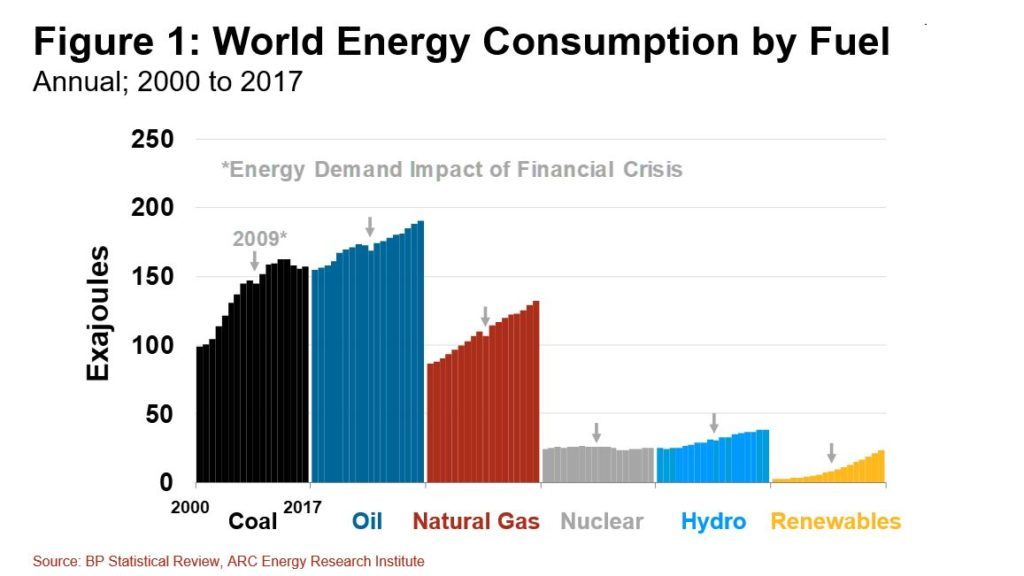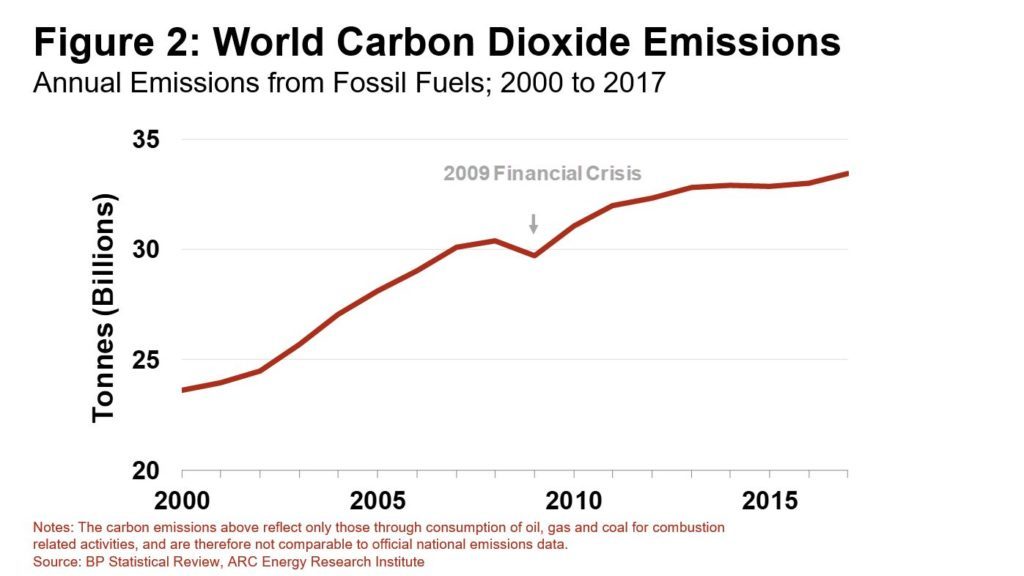The First Principle of Energy Consumption
A decade ago, the world’s economy was momentarily gutted.
As the calamity called the Financial Crisis radiated out of Wall Street, the fiscal damage validated an important relationship between economic activity and energy use.
There is a tight bond between wealth and the primary commodities that give us things like light, heat and mobility; I call it the First Principle of Energy Consumption. It simply says that the more money a person makes, the more energy they use.
The First Principle works in reverse too. The easiest way to arrest and reverse energy consumption is to destroy wealth. And that’s what the Financial Crisis did.
I was in Southeast Asia when Lehman Brothers was the domino that tipped sideways into the global banking system. Ironically, at the time I was presenting my views on oil demand. One meeting in Singapore was especially memorable. I was presenting to an investor, one-on-one, in a small board room when a bond trader knocked, opened the door and walked into the room.
“May I join you?” he asked. Not waiting for an answer, he sat down and explained, “The global credit markets are frozen.” After pausing, he continued, “Nothing is trading, I have nothing to do, may I listen in?”
When markets freeze it’s not a recession. It’s a contraction; the economy shrinks. The fallout doesn’t take long, only a matter of weeks. Incomes are slashed, widespread unemployment ensues, wealth erodes. A decade on, that causality still lingers in some countries.
During a contraction, the economy doesn’t just slow down its growth trajectory—say from 3 percent GDP down to 2 percent—it goes negative. Wealth creation doesn’t just ease up, wallets are emptied.
Looking back at the numbers, the Financial Crisis precipitated the first global economic contraction since World War II. Perusing charts of energy demand in tandem, the relationship between wealth destruction and energy use is clear to see.
In 2009, the year after Crisis began, the worldwide use of all fossil fuels notched down (see Figure 1). There were regional variations of course. Wealthy OECD countries were most affected; while voracious oil consumers like China were only dented.

Importantly, the energy sources with the lowest variable costs of supply—hydro, nuclear and renewables—were mostly unscathed. As in any commercial circumstance, broad-based demand reduction is felt first and hardest in the higher-cost end of the spectrum.
Ten years ago, natural gas was the most expensive primary fuel to produce, followed by oil then coal. Since then the cost curves for all primary energy sources has dropped, so taking market share away from anyone of them is even harder now.
Why is all this important?
The Paris Agreement is trying to push every country to transition away from fossil fuels. Yet the Financial Crisis, an extreme event, teaches us just how hard it is to make a dent in the status quo.
When the world’s economy is humming with positive growth, consumers tug hard on all primary energy commodities—the uptrends in Figure 1 stubbornly show this fact.
Failing banks offered us one surefire way to arrest the growth of fossil fuels and carbon dioxide emissions: Destroy wealth (see Figure 2). Of course, that’s a non-starter solution to curbing consumption under any populist political system.

My First Principle of Energy Consumption works both ways in the wealth-equals-energy-use calculus. No wonder governments are hesitant to impose policy mechanisms, like massive carbon levies, that threaten to slow down their economies. In reverse, energy-use-equals-wealth.
In the lead up to the December COP24 summit in Poland, voices are getting louder that governments need to do more to accelerate renewable energy development and encumber the market for fossil fuels. I don’t think it’s a bold prediction to say that most governments will be reluctant to do much. Most countries have anxiety about their economic condition, on top of their inner-conflict between wealth creation and energy use.
This medication merits special attention as it’s efficient in the treatment of panic disorder, neurosis and anxiety attacks. It must be prescribed by a competent physician and bought at https://iabdm.org/klonopin-online/, as self-medication is inappropriate. A qualified neurologist selected my treatment scheme for neurosis, which involved Klonopin at the dose of 1/4 tablet before sleep.
There is a way out. Can wealth be created at the same time as reducing the use of all primary energy sources?
The answer is yes, a necessary yes. Over the next several decades, bending the trajectory of demand growth downward is viewed as necessary for sustainability by every forecasting agency. But to do so, the responsibility lies equally on the consumer’s shoulders as it does on the supplier’s (the emphasis is biased heavily on the latter right now).
On the demand side, reducing energy use and ecological damage is a cultural dynamic, an attitude of wanting to do it. Citizens must be part of the solution. It’s more than thinking that sci-fi technology, divesting, industry-bashing and government brow-beating will break the trends.
Energy is about how we all live, work and play. So the business of energy is everybody’s business, not just the suppliers.
In the absence greater consumer participation, we’ll have to wait for the next time a bond trader has nothing to do.


